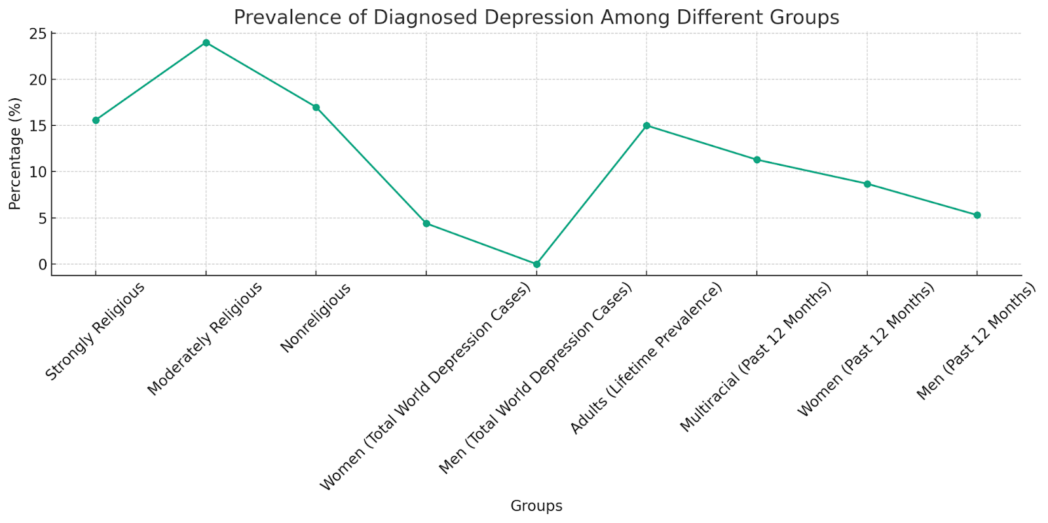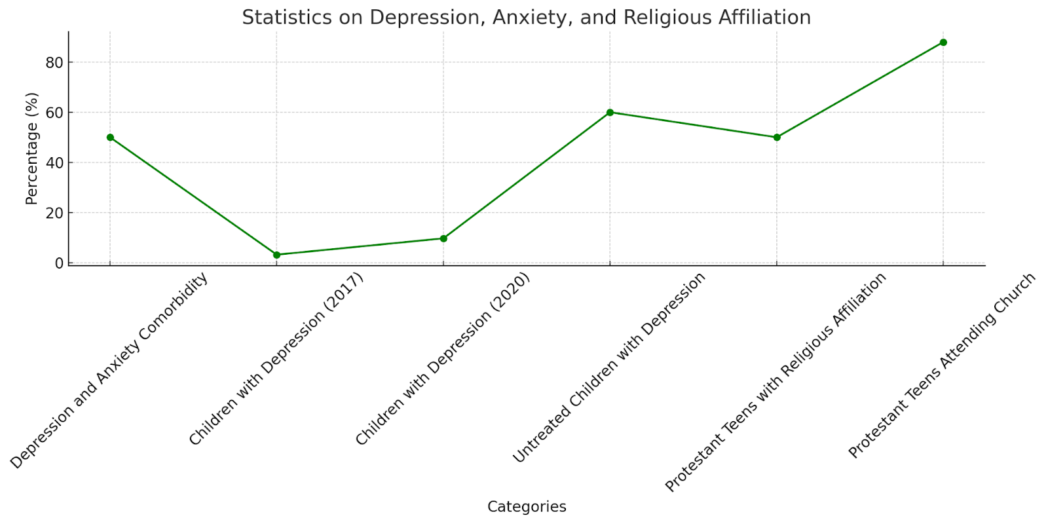In today’s fast-paced and often stressful world, emotional health issues like depression have become a prevalent concern affecting millions of people across the world. The exploration of various factors that influence psychological wellness is vital to understanding the complex nature of depression. Religion, being an integral part of many individuals’ lives, has long been suggested as a potential mitigating or exacerbating aspect in your psychological state. In this article, we delve into the realm of religion and depression statistics, shedding light on the connection between religious beliefs and this prevalent mental health condition.
The Link Between Religion and Mental Health
Religion and mental health have been the subject of extensive research, learning about the potential impact of tenets and rituals of religious faiths on psychological well-being. While the relationship between religion and emotional state is complex and multifaceted, several key factors and trends have emerged from studies conducted in this field.
Protective Factors
Numerous individuals discover solace, reassurance, and a profound sense of meaning through their religious convictions. Participating in religious rituals, such as prayer, meditation, or attending religious gatherings, can offer a support network and a structure for effectively navigating the trials of life. Research suggests that religious involvement can act as an influential factor that can help safeguard against various psychological challenges, like depression and anxiety. The social support networks within religious communities can offer emotional support, encouragement, and a sense of belonging, which can positively impact mental well-being.
Hope and Resilience
Religion often offers a source of hope, promoting resilience in times of adversity. Believers may find comfort in the belief that a higher power is watching over them and guiding them through difficult circumstances. The presence of hope and resilience can have a positive impact on mental health results, enabling individuals to effectively navigate and cope with stress, trauma, and bereavement.
Sense of Meaning and Purpose
Theological perspectives provide a structure through which people can comprehend the significance and direction of lives. This feeling of meaning can offer those people a sense of direction and help them find a greater purpose beyond their immediate struggles. Having a clear sense of purpose has been linked to better emotional stability and total wellness.
Coping Mechanisms
Religion often offers coping mechanisms that individuals can utilize during times of distress. Prayer, meditation, worship traditions, and scripture study are examples of religious practices that can provide comfort and stress relief. Participating in these ventures may help people manage their emotions and find inner peace and calm.
Cultural and Community Factors
Religion is deeply embedded in culture and can contribute to a strong sense of community. Membership in a faith community can provide individuals with a care network of like-minded individuals who share common values and beliefs. The social connections and sense of belonging within religious communities can positively impact mental health and reduce feelings of isolation and loneliness.
It is essential to note that while faith yields beneficial impacts on emotional wellness, it is not a guarantee and personal experiences may vary. Some individuals may struggle with religious guilt, conflicts between their convictions and personal values, or feel pressured to meet certain expectations, which can negatively impact their mental well-being.
Understanding Depression
Depression is a complex and debilitating mental health disorder that affects millions worldwide. Acquiring a comprehensive understanding is of utmost importance of depression to recognize its signs, support those who are affected, and promote effective treatment and prevention strategies. Common symptoms include:
- Continual feelings of sadness, anxiety, or an enduring sense of emptiness;
- Diminished enjoyment or loss of interest in once enjoyable hobbies and activities;
- Fatigue or lack of energy;
- Changes in appetite and weight;
- Sleep disturbances (insomnia or excessive sleeping);
- Difficulty concentrating, making decisions, or remembering details;
- Sensations of guilt and diminished self-worth, or hopelessness;
- Recurrent thoughts of death or suicide.
Depression is a prevalent mental health disorder affecting people of all ages, genders, and backgrounds. The World Health Organization (WHO) reports that over 264 million individuals globally experience this state, making it a prominent contributor to global disability and profoundly affecting one’s quality of life.
Exploring the Statistics
Several studies have examined the correlation between religiosity (the degree of faith-based devotion) and depression. Interestingly, findings have been mixed. A few research suggests that higher levels of religiosity can be protective against this illness, as theological beliefs may provide comfort, hope, and a sense of meaning. Conversely, other studies have indicated that certain aspects of religiosity, such as guilt, excessive self-blame, or rigid doctrines, can contribute to or exacerbate depression. Let’s take a look at some general numbers.

- According to statistics, individuals who strongly identify with their religious beliefs have a smaller prevalence of diagnosed depression in comparasion to those who are moderately religious or nonreligious. Specifically, 15.6% of strongly religious individuals have been diagnosed with depression, which is 24% and 17% lower than the rates observed among moderately religious and nonreligious individuals, respectively. These statistics indicate a correlation between spirituality and psychological well-being, suggesting that having a strong faith may have a positive impact on psychological wellness by reducing the likelihood of experiencing diagnosed depression;
- Religion acts as a strategy for managing or dealing with challenges for individuals grappling with depression, and it is noteworthy that women have a higher incidence of depression, constituting 4.4% of the total world depression cases. In the face of depression, religion can provide valuable support, particularly for women who exhibit a greater vulnerability to this mental health condition compared to men;
- Approximately 15% of adults will experience depression at some stage in their lives. In the past 12 months, 11.3% of individuals identifying as belonging to two or more races have had a severe phase of depressive state. Additionally, women have a higher occurrence or frequency, with 8.7% of women experiencing it compared to 5.3% of men.

The graph compares strongly religious, moderately religious, and nonreligious individuals, as well as breakdowns by gender and racial identity, in terms of their depression rates.
Furthermore, a significant portion, approximately 50%, of individuals diagnosed with depression also meet the criteria for an anxiety disorder diagnosis., highlighting the comorbidity and overlap between these two mental health conditions.
- Among children aged 3 to 17, 3.2% were found to have depression, with a notable increase to 9.7% in 2020. Alarmingly, 60% of these children did not receive any form of treatment for their condition.
This statistic holds significance in the context of Religion and Depression Statistics as it highlights the prevalence of depression among young individuals and underscores the urgent need for enhanced cognitive wellness resources and support systems. Efforts must be made to provide adequate assistance to those suffering from depression in order to ensure their comprehensive psychological well-being.
- Among Protestant families, a significant quantity of teenagers and youngsters exhibit a religious affiliation, with almost half of them sharing the same beliefs as their parents. Additionally, a significant 88% of these teens regularly attend church services.
Studies indicate that faith affiliation can act as a protective factor against depression. The presence of a robust religious community and belief system can offer individuals a sense of purpose and belonging, which in turn can contribute to a reduction in depressive symptoms.
- Religion holds significance for teenagers, as evidenced by the fact that 35% attend religious activities out of their own desire, while 38% primarily do so because their parents want them to.

The graph illustrates the comorbidity of depression and anxiety disorders, the increasing rates of depression among children, the lack of treatment for these children, and the religious affiliation and church attendance rates among Protestant teens.
Interestingly, teenagers tend to be more engaged with religion compared to their parents. This heightened participation in devotional acts among teens could potentially serve as a positive factor in reducing depression among this age group.
Summing Up
The relationship between religion and depression is a complex subject with no definitive conclusions. While religion can provide individuals with comfort, hope, and assistance from social networkst, it can contribute to or exacerbate depressive symptoms depending on various factors. It is crucial to approach the topic with sensitivity, recognizing that each individual’s experience may differ based on personal beliefs, cultural context, and social support networks.
As we continue to delve into the realm of mental health, research efforts should aim to better understand the nuanced interplay between religion and depression. By fostering an open dialogue and encouraging interdisciplinary studies, we can promote mental well-being within religious communities while ensuring appropriate support and resources are available for those in need.
Remember, if you or someone you know is experiencing symptoms of depression, seeking professional help from mental health experts, therapists, or religious leaders can provide valuable guidance and support on the path to recovery.


No Responses